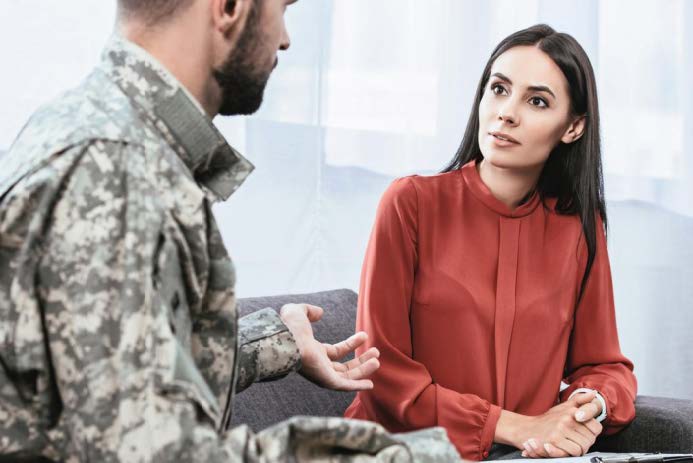MILITARY LIFE
A violent act, catastrophic accident, or sudden loss can leave you feeling anxious and fearful, which are normal reactions. But if anxiety and fears are taking over your or a loved one's life, you may want to consider professional help.
Military OneSource offers confidential, non-medical counseling - face to face, online, by phone or video - along with the Military Crisis Line at 800-273-TALK (8255), and resources for post-traumatic stress disorder. All are available for free.
Reminders and events can trigger post-traumatic stress disorder, bringing back painful memories and emotions for months or even years after the trauma. Learn about common reactions to trauma, some coping mechanisms and ways to help others, along with resources for more information and help.
COMMON FEELINGS AND REACTIONS FOLLOWING A TRAUMA
Traumatic events may cause you or someone you love to experience a range of feelings and reactions, such as: • Sadness • Fear • Anger • Irritability • Anxiety • Inability to concentrate • Disruption of sleep patterns • Eating problems increase or decrease Although these feelings and reactions are normal, you can help yourself or your loved one manage and cope with them so they don't become overpowering.
POSSIBLE COPING MECHANISMS
Coping strategies like these may help you or your loved one recover from anxiety, depression or other post-trauma feelings and reactions that may be impacting your life. Strategies may include the following: • Spend time talking and sharing your feelings with people you love. Doing so can put things in perspective, which may make your day-to-day life more manageable. It can also help you focus on positive relationships instead of the traumatic event.
• Take care of yourself. If you feel well physically, you might manage your feelings and reactions better. Eat healthy foods, exercise moderately, get enough sleep, and take any medications prescribed for you. Avoid using drugs or alcohol to cope – this may lead to you feeling worse over time.
• Try to stick to your typical, day-to-day routine. It can be a healthy distraction from feelings after a traumatic event. Going back to your home and work responsibilities can renew a sense of purpose and lessen feelings of isolation.
• Practice stress-relieving techniques. Exercise, journaling, meditation, listening to music and deep breathing techniques are just a few activities that can help relieve stress by focusing your mind on something other than the traumatic event. Try these to find what works best for you.
• Avoid media coverage of the event for a while. Too many reminders or fixating on the event may heighten your anxiety. If it's unavoidable, try to watch any news coverage with a friend or supporter and discuss the event or your feelings if you feel comfortable.
• Don't be afraid to seek support from friends, family and professionals. Many people also find comfort in their religious beliefs and faith communities during difficult times.
• Include him or her in your family events and normal daily routines. This can help relieve feelings of isolation. Each person reacts differently to trauma, so be patient when offering help, and expect a range of emotions and reactions. Check in periodically and let him or her know you're available for support throughout the coping process.

ENLISTING HELP: No one has to struggle alone; in fact, asking for help is a sign of strength. Friends and family can provide a lot of support, but you may also consider seeking help from a counselor or professional therapist.
EXTENDING HELP IN TIMES OF CRISIS
If a friend or relative is deeply affected by a trauma, there are ways you can help. People who go through a traumatic event may not get a chance to talk about their feelings and experiences. They might think they don't need to share their feelings, or they think something's wrong with them because they're having trouble coping. Here's how you can help:
• Reassure him or her the emotions they're feeling are a normal reaction to a traumatic event. Remind them fear, anger, hopelessness and shock are common feelings others – possibly even you - have had.
• Share your feelings. If you experienced a similar event, your insight could be comforting.
•Invite your co-worker, friend or relative to a ceremony, vigil, religious service or fundraising event. Taking part in efforts to remember or help the victims of a tragedy and their families can bring comfort and a sense of community. Sometimes just being with other people who experienced trauma can help with emotional isolation.
RESOURCES AND SUPPORT
No one has to struggle alone; in fact, asking for help is a sign of strength. Friends and family can provide a lot of support, but you may also consider seeking help from a counselor or professional therapist.
Free, confidential, non-medical counseling is available 24/7 from Military OneSource, whose consultants can refer service members and their families to services in their local community. Non-medical counseling services are also available face to face, online, by phone or video by calling 800-342-9647. OCONUS/International? Visit militaryonesource.mil/international-call- ing-options for calling options. Your installation's Family Support Center can also provide confidential, non-medical counseling with Military and Family Life Counselors ( militaryonesource.mil/confidential-help/non-medical-counseling/military-and-fam- ily-life-counseling). Find out how Children and Youth Behavioral Military and Family Life Counselors ( militaryonesource.mil/confi- dential-help/non-medical-counseling/military-and-family-life-counseling/military-andfamily-life-counseling-the-essentials) can help your child cope. Coping with a traumatic event can be complicated and can take time for you and those you love. You're not alone. Use your available resources to help you manage and cope with your feelings.